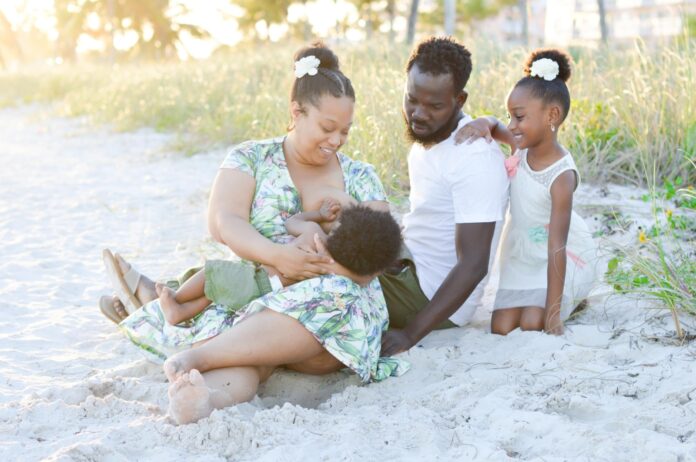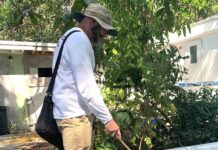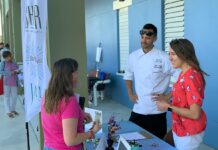
For thousands of years, mothers have breastfed their infants. It is a well-proven strategy which has nurtured our ancestors and is still relevant, optimal and ideal today.
Scientists are studying its remarkable adaptive abilities, its newly-discovered properties and its continual positive effects on both infant and maternal health. However, this doesn’t mean breastfeeding, although simple, is always easy for every mom.
Thousands of years ago, moms had their own mothers and extended family who knew about breastfeeding from a store of collective knowledge, passed down from generation to generation. Regrettably, some of this knowledge has been lost in certain cultures and needs to be regained.
As societies advance, we realize some things never change — breast is still best. Formula has its rightful place, medically as a last resort, and as a choice for those who have extenuating circumstances, for those who can’t and for those who won’t. Given the chance to receive education and support, most moms would like to breastfeed when they realize the benefits not only to their babies but to themselves. For example, once breastfeeding is well-established within the first few weeks, it is possible for moms to exclusively provide breastmilk to their babies while also working full-time through the modern invention of the breast pump.
An excerpt from the National Library of Medicine, published in September 2021, states that “Extensive data demonstrate that breastfed children have a lower incidence of many acute or chronic diseases, such as otitis media, acute diarrhea, lower respiratory tract infections, sudden infant death syndrome, inflammatory bowel disease, juvenile leukemia, diabetes, obesity, asthma and atopic dermatitis. It is known that exclusive breastfeeding for the first 6 months of age lowers mortality against infectious diseases by 88% and lowers the possibility of death compared to partial breastfeeding as a dose dependent effect.”
The American Academy of Pediatrics caused a stir last year when it amended its breastfeeding recommendations to reflect the increasing body of research which supports breastfeeding past the 12-month mark. The new recommendations, updated in June 2022, support continued breastfeeding until 2 years or beyond, as mutually desired by mother and child. This recommendation, made in light of new research, indicates that prolonged breastfeeding, well into toddlerhood, has a positive effect on mothers’ health and lowers the risk for cervical cancer and breast cancer.
Breastfeeding is also not solely for nutrition, as its auxiliary positives include built-in skin-to-skin contact, which nurtures trust, closeness and secure attachment. By its very nature, breastfeeding promotes ideal heart rate, temperature regulation and respiration in newborns. Exclusive breastfeeding also lowers the risk for postpartum depression.
Why are we talking about breastfeeding? The question ought to be flipped: Why are we not talking about breastfeeding? Observed since 2011, August is National Breastfeeding Month, established by the U.S. Breastfeeding Committee (USBC). World Breastfeeding Week (WBW), is celebrated Aug. 1 through Aug. 7.
Each week in National Breastfeeding Month is dedicated to raising awareness on specific topics: Week 1, World Breastfeeding Week; Week 2, Indigenous Milk Medicine Week; Week 3, Asian American/Native American and Pacific Islander; Week 4, Black Breastfeeding Week; and Week 5, Semana de la Lactancia Latina (Week of Latin Lactation). The 2023 World Breastfeeding Week overarching theme is “Enabling Breastfeeding: Making a difference for working parents.”
We all have heard the popular phrase “it takes a village.” This is as true for breastfeeding as it is for raising children in general. Many mothers feel they don’t have the resources — whether they be financial, physical or emotional — to breastfeed, because they lack support. Mothers need support — from their families, healthcare providers and communities at large.
In Monroe County, the Florida Department of Health’s Women, Infants and Children (WIC), private lactation consultants, and organizations such the Florida Keys Healthy Start Coalition help mothers get off to a good start in their breastfeeding journey. With the goal of good health for all the Florida Keys front and center, breastfeeding is the foundation for its youngest members, their mothers and their families. This radiates outward to benefit us all.
More information on the Florida Keys Healthy Start Coalition is at keyshealthystart.org. Information on WIC Monroe is at monroe.floridahealth.gov/programs-and-services/wellness-programs/wic/index.html
— DePaula is a breastfeeding peer counselor coordinator/breastfeeding expert for the Florida Department of Health – Monroe County WIC Program.





















